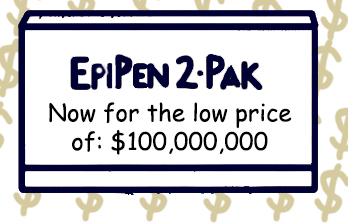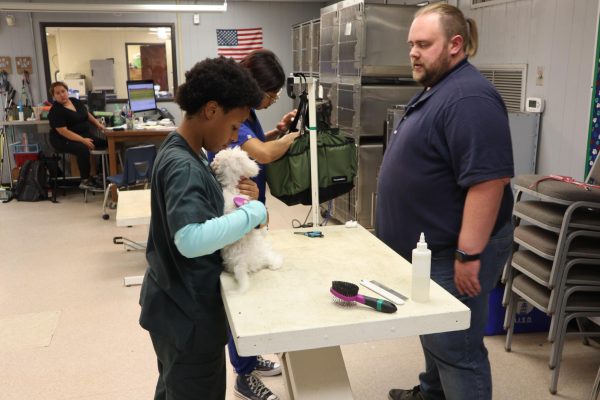EpiPen price increases continue to get more ridiculous
October 15, 2016
If something as small as a peanut could cause a loved one to suffer an extreme allergic reaction possibly leading to death, how much would you pay?
That appears to be the question that pharmaceutical company Mylan is testing as it has raised the price of it’s life-saving EpiPen anti-allergy medication from less than $100 in 2007 to more than $600 this year.
According to an Aug. 22 article in The New York Times, families most affected by the price hike are those who don’t have insurance or those with high-deductible health plans. This means that the people who can least afford the medication are the ones feeling the pain of the price hike the most.
It’s no coincidence, that the price increased even higher this year. The article from the Times says that a competing drug maker’s product was recalled last year, leaving Mylan as the only company selling a primary emergency treatment for severe allergic reactions.
That hike was an enormous jump from $100 to $600, making it much harder for anyone with an extreme allergic reaction to get a hold of, and therefore putting lives at risk. At a time where many people would worry about specific allergic reactions, and especially the severe ones, why is it that Mylan would raise their price? This decision is surely one which has been made with complete disregard for anyone who has budget problems, or any type of financial problems.
Another thing that is occurring with this pricing issue is that Mylan, with their new monopoly on the market now feels invincible, as they not only have increased the price of their base product, but also of the children’s dosage, EpiPen JR.
In an attempt to diffuse criticism for the rapid price increase, Mylan began offering coupons to lower the cost of the drug for people on certain health service plans or low-income households. And then the company announced that it would produce a $300 generic version of the drug. Critics argue that this reduced price generic version is just a ploy to make the company’s image look better while it continues to rake in large profits, maintaining its dominance over a market of a vastly overpriced product.
Many students at Akins keep EpiPens at the nurse’s office in case they have an extreme allergic reaction. One student, who asked to not be named, said her father has one in case he needs it to give him enough time to make it to the hospital when he has bad allergic reactions.
Another problem, on top of all of these, is that Mylan is a monopoly. They are extremely dominant over this part of their industry and it is making it harder for other companies to compete with them while all they do is gain more and more revenue from the product that they are the sole producer.
If this continues, what happens to the Antitrust laws that we have in place? And furthermore what happens to EpiPen users who are in severe need for this product, and then the patent runs out? Will they be forced to cut back on production, thus limiting the overall distribution of EpiPens that are life-saving? Or will they renew their patent and continue to monopolize on this industry? There are way too many people who rely on this to bring these prices up and quite frankly I would think that it’s robbery and a mockery of ethics. In a time when companies raise their prices to be this high and there’s nothing we can do about it, it feels kind of hard to trust the product they’re giving, and it doesn’t seem that fair to people who need the product but can barely afford other items for themselves.









